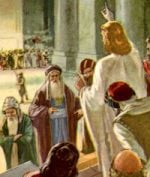A North Carolina bishop threatens a full-scale ‘liturgy war’
By Phil Lawler ( bio - articles - email ) | May 28, 2025
With a directive that bans the celebration of the Traditional Latin Mass (TLM) in his parishes, and the threat of more detailed instructions barring even modest incorporation of traditional practices, Bishop Michael Martin of Charlotte, North Carolina, threatens to re-ignite the bitter “liturgy wars” that divided the Catholic Church in the 1960s and 1970s. Ironically, the bishop explains his policy proposals as a means of fostering greater unity among the faithful.
Last week Bishop Martin announced that he would prohibit the use of the traditional liturgy in parish churches to “promote the concord and unity of the Church.” He said that the TLM would be allowed only in one chapel which will be renovated to serve the traditionalist Catholics of the diocese—a territory that covers more than 20,000 square miles in the rugged hills of western North Carolina.
That announcement naturally caused consternation among Catholics devoted to the TLM, who had hoped that the election of Pope Leo XIV might lead to an easing of restrictions on the old liturgy. But their disappointment turned to outrage with the revelation that Bishop Martin was planning a far more minute regulation of liturgical practices, discouraging and even forbidding the use of altar rails, the Latin language, and the ad orientem posture—all of which are permitted if not encouraged by official Vatican directives.
The traditionalist Rorate Caeli web site unearthed a draft of the regulations that Bishop Martin evidently planned to release. The Pillar later confirmed that the bishop’s letter was genuine, but added that the implementation of the proposed policies had been delayed, because of opposition among the priests of the Charlotte diocese. (Several priests had already written to the bishop, urging him to reconsider his ban on the TLM in parishes.) The reasons for that resistance were easy to discern. Bishop Martin’s policy proposal would have gone far beyond the prohibition on the TLM, to forbid any incorporation of traditional liturgical practices in the Novus Ordo.
In his lengthy and highly detailed policy proposal, Bishop Martin decreed that:
- “Mass must be celebrated facing the people.”
- Altar rails may not be used, even when they are intact.
- Neither an upright crucifix nor fixed candles may be placed on the altar, lest they interfere with the sight-lines of the congregation.
- The Latin language should not be used in Mass parts, congregational responses, or hymns “since they hinder people’s participation.”
Each of these liturgical policies contradict the directives issued by the Vatican and the General Instruction for Roman Missal (GIRM). In fact, Pope Leo XIV, since his election, has already presided at several public Masses that would violate the tight regulations planned by Bishop Martin.
The bishop’s letter is in places misleading to the point of dishonesty, as for instance when he cites the GIRM—which recommends the placement of candles on or around the altar—as the basis for rejecting the placement of candles on the altar. At other times it is intellectually shoddy, as in the claim: “It is fallacious to think that if we employ Latin more frequently, the faithful will get used to it and finally understand it.” Bishop Martin insults past generations when he writes: “Our ancestors ‘heard’ the Mass in Latin every Sunday but never understood it.” Should we then conclude that only in the late 20th century did Catholics begin to understand the Mass?
Bishop Martin’s letter invokes the authority of Pope Francis, in a way that clearly indicates it was written while the late Pontiff was still alive. The bishop’s decision to follow through with his policies, even after the Pope’s death, poses a challenge for Pope Leo—perhaps even a deliberate test of the new Pope’s mettle. Will he support a bishop who goes beyond even the tight restrictions imposed by Traditionis Custodes on the traditional liturgy, and even stretches the point to suppress even hints of traditional practices in the Novus Ordo?
The bishop’s draconian proposals also pose a challenge for other American bishops, who will be forced to deal with the renewed fears of Traditionalist Catholics, and/or with demands from their “progressive” counterparts for the same sort of bans that are being instituted in North Carolina. If a bishop can be rebuked and even removed for offenses against collegiality, for straining the unity among the faithful, this is a crucial test case.
All comments are moderated. To lighten our editing burden, only current donors are allowed to Sound Off. If you are a current donor, log in to see the comment form; otherwise please support our work, and Sound Off!
-
Posted by: esfrausto3426 -
Jun. 01, 2025 1:21 AM ET USA
I go to confession at my local novus ordo parish. I attend Mass at my FSSP church. I believe my confession is valid .But when I hear and participate in the Latin Mass, I join in with the thousands & thousands throughout time. It is an alive language. Praise God!
-
Posted by: Tim S. -
May. 31, 2025 6:03 AM ET USA
Instead of attacking reverent practices by the faithful, perhaps this bishop should take a look at correcting liturgical abuses and practices which are not in the Missal but are done everywhere. The list can be quite extensive.
-
Posted by: feedback -
May. 29, 2025 8:17 AM ET USA
Looks like the Diocese of Charlotte is ready for a new Bishop. And Bishop Joseph Strickland is still without a diocese. Let us pray and hope for a godly resolution to this ungodly mess.
-
Posted by: Randal Mandock -
May. 28, 2025 5:48 PM ET USA
Yes, a crucial test case. Of course, it is just one among many.





